Content
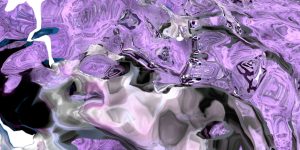
Women in Media Arts
Ars Electronica (AT)
In 2016, Ars Electronica launched one of the largest online databases for women in media arts. This database, first dedicated to the women pioneers of Ars Electronica, was then opened to all female artists working with digital means as a tool for artistic expression. A whole program focus was thus established and will be presented this year in two panels.
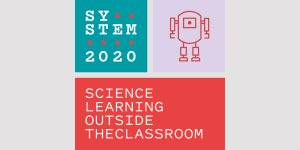
SYSTEM2020 Map
Science learning initiatives outside the classroom are crucial in educating and forming Europe’s next generation of researchers and innovators. By gaining insights into these initiatives all around Europe SySTEM 2020 wants to gain a better understanding of the types and kinds of programmes in operation, learn from each other and collaborate to be able to respond to challenges ahead. The SySTEM 2020 map is an online visualisation tool where over 2000 STEAM initiatives or projects are mapped providing a network of organisations for you to connect with. For the general public it offers a way to find informal learning initiatives in their area. For organisations it offers the opportunity to get connected and gain visibility as a collective community within Europe.
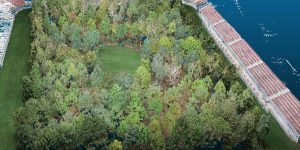
AI x Ecology
Carla Gomes (US/PT), Tega Brain (AU), Mark Coeckelbergh (BE), Lynn Kaack (DE), Stafano Nativi (IT), Claire Monteleoni (US), Martina Mara (AT)
The panel on AIxEcology will focus on the importance of computer-controlled systems for ecology and the environment. Artificial intelligence can be used to save water, stop species loss or detect plants in the field. By optimizing the monitoring of ecosystems, a significant contribution can be made to reduce the risk of climate change and counteract it, as more and more projects try to fight it through data and artificial intelligence.
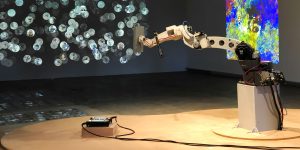
The New Real: Experiental AI and the AI Lab
Jake Elwes (UK), Drew Hemment (UK), Caroline Sinders (US), Anna Ridler (UK), Mahir Yavuz (TR)
The New Real explores the boundary between the real and the artificial as we attempt to emerge into and understand the so-called New Normal. Individual and collective resilience is predicated on the wider use of networked, online tools and environments by the majority of the population in a huge diversity of professional, domestic and leisure settings. At the same time, the crisis is unfolding in a context in which trust in data-driven online content and interaction are being challenged like never before.
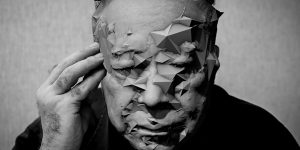
AI x Humanity
Rasha Abdul-Rahim, Adam Harvey (US/DE), Nye Thomson (UK), Milena Marin (RO), Victoria Vesna (US)
A series of panel discussions will be presented as part of the European ARTificial Intelligence Lab this year. Every evening, there will be one panel dedicated to a different topic, aiming to elucidate and educate about the impact of AI on society. The panels will bring AI related scientific, technological and artistic experts together in order to contribute to a critical and reflective debate beyond the technological and economic horizon of artificial intelligence.
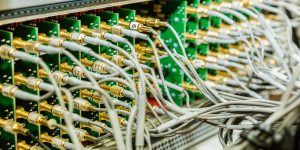
Ars Electronica AIxMusic Online Hackathon: Final Presentations
Annelies Termeer (NL) moderator + Participants
For the occasion of the first online Festival, Ars Electronica will host its first international AIxMusic Hackathon as part of the AIxMusic Festival 2020.

An Atlas of Absence - Online meeting performance
Summer Mei Ling Lee and Laura Boles Faw
Technology was supposed to connect us. The dominant modality for communication and connection during this pandemic era is the digital screen. In this work, collaborators Laura Boles Faw and Summer Mei Ling Lee continue their ongoing series addressing distance and longing that increasingly figures into this heightened moment.
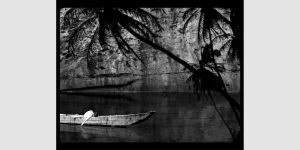
Falling Up Exhibition
re.riddle, California, San Francisco (US)
Amidst riots and racial tensions, divisive political rhetoric and a global pandemic, the past half year has been a time of turbulent uncertainty. These acute ruptures and moments of pain, conflict and unknowingness have inadvertently led to a mode of seeing our former and current realities anew, which may more or less best be described as “surreal”.
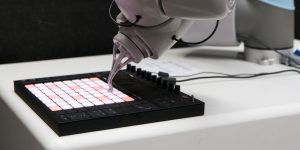
AIxMusic - Artificial Stupidity
Moisés Horta-Valenzuela (MX/US), Artemi-Maria Gioti (GR), Ali Nikrang (AT), Alex Braga (IT) and Portrait XO (US)
The panel on Artificial Stupidity invites artist present at the Ars Electronica Festival to share their experiences in the context of AIxMusic. AI is a media trend right now and a controversial topic.
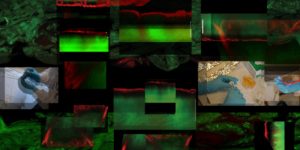
Demystifying Arts and Sciences through Playful Creative Technologies
Jo Berry (UK)
Jo Berry has implemented playful, creative methodologies to seek art's value, purpose and interpretational impact when it takes as its start point advanced imaging and microscopy. Her claim is that art can be a significant contributing factor to new directives in advanced imaging and microscopy; its impact intensified through applying play as a method to interrogate ideas, processes and outcomes. She offers a new model of research, which engages play as the critical driver to accomplish a more agile, accessible and open method of examining science via a different set of criteria. This hypothesis is based on my own prior experience as a researcher working directly with scientists and experiencing scientific method where I became convinced that artists should be central to scientific inquiry not just working on the periphery. As it would seem there needs to be a paradigm shift within science which, she claims, can be activated through examining play through art and identifying its effect on aspects of culture, creativity and aesthetics.
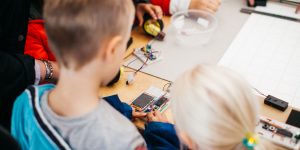
STEAM alignment across different educational levels at the University of Amsterdam
University of Amsterdam (NL)
This approach to STEAM education covers two programmes taught at the University of Amsterdam (UvA): the BSc Information Studies (three years) and the MSc Information Studies (one year) which are both located in the Computing Department. The approach provides students on both levels with room for exploration of the field based on shared activities mainly through project work. The aim is to provide students with technological, human and societal insights (theories, models, system implementations) so that they can comprehend and place themselves in the field of information science. The programmes are aimed at students from a mixture of subject backgrounds but joined in the desire to solve complex societal problems, using ICT and digital media.
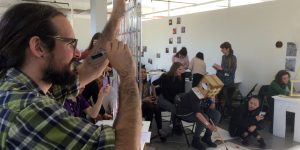
A Hybrid STEAM approach from the MA Art and Science at Central Saint Martins
University of the Arts London: Central Saint Martins (UK)
The MA Arts and Science (MAAS) is a two-year Master's programme, founded in 2011, recruiting students from different disciplinary backgrounds across the arts, sciences and humanities. The course builds a STEAM community utilising a shared studio space as a resource and setting for collaboration and cooperation. The philosophy of the course brings together different knowledges and aims to create a non-hierarchical platform for students, disciplines and methods.
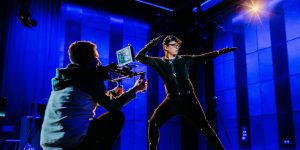
STEAM Education in Europe II
Participating Gardens: Birmingham - STEAMhouse, Castelo di Rodrigo - Open Science Hub, European Platform for Digital Humanism - Creative School
What constitutes creativity and imagination is a potentially contentious point, yet an outlook that focuses on areas of intersection between the arts and sciences can lead to certain, tangible benefits. These can include techniques for collaborating across disciplines, an ability to consider varied perspectives, and skills in identifying points of common ground. Such competencies are combinatorial in nature, and if integrated into a higher education curriculum, will lead to an acceleration in transdisciplinary innovation. Join us in our Birmingham Garden as we explore approaches to STEAM education with some of the leading transdisciplinary institutions in Europe.

STEAM Education in Europe I
Participating Gardens: Birmingham - STEAMhouse, Amsterdam - NXT Museum, European Platform for Digital Humanism - STEAM INC
What constitutes creativity and imagination is a potentially contentious point, yet an outlook that focuses on areas of intersection between the arts and sciences can lead to certain, tangible benefits. These can include techniques for collaborating across disciplines, an ability to consider varied perspectives, and skills in identifying points of common ground. Such competencies are combinatorial in nature, and if integrated into a higher education curriculum, will lead to an acceleration in transdisciplinary innovation. Join us in our Birmingham Garden as we explore approaches to STEAM education with some of the leading transdisciplinary institutions in Europe.
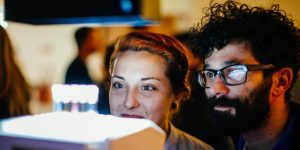
STEAM Approaches at Science Gallery at Trinity College Dublin
Science Gallery at Trinity College Dublin (IE)
Science Gallery Dublin was founded at Trinity College Dublin, the University of Dublin in 2008, with a mission to ignite creativity and discovery where science and art collide.
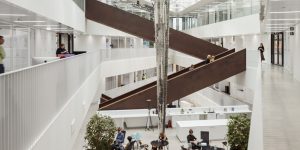
Arts for All: Aalto University-Wide Art Studies
Aalto University (FI)
The University-Wide Art Studies (UWAS) programme at Aalto University offers all students, irrespective of discipline, the chance to explore and study art and design-based practices and processes. This is a vehicle for the wider ambition of the institution to encourage the formation of transdisciplinary communities of teachers, students and researchers, with a view to tackling global challenges in imaginative and meaningful ways. There is an understanding that art and design should be considered to have a deeper purpose than the simply aesthetic: creativity can help society to be renewed.

STEAM Education in VR + AR
Participating Gardens: Birmingham - STEAMhouse, Sydney - Tactical Space Lab, European Platform for Digital Humanism - STEAM INC
Can our systems manage themselves? How can we design resilient institutional structures that are self-adaptive? In this tour we will visit a selection of participating gardens who are experimenting with institutional models that can adapt to future challenges.
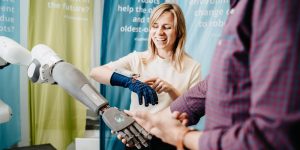
STEAM Approaches at Technische Universität Dresden
Technische Universität Dresden (DE)
The Technische Universität Dresden presents a number of approaches that employ concepts closely connected to STEAM and are transferred into/developed for teaching.
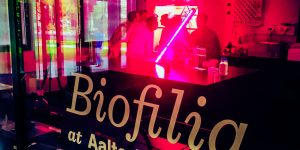
Aalto Biofilia: A journey into the biological arts
Aalto University (FI)
Biofilia is a technical facility at Aalto University for studies in the biological arts as a fast-emerging area of interest that fits succinctly with STEAM approaches in artistic practice. It adopts transdisciplinary knowledge sharing to research and curriculum development to explore the intersection between biosciences, engineering and the arts.
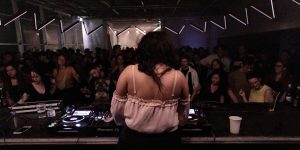
OK Night 2020
OÖ Landes-Kultur GmbH AT
OK Night is a yearly presented nightline format at OÖ Kulturquartier on Ars Electronica’s Saturday. Originally conceived to present performative works from the range of Prix Ars Electronica awarded works the night also features local and international club culture.


